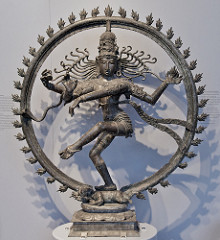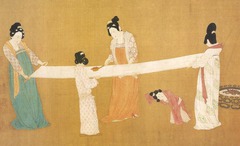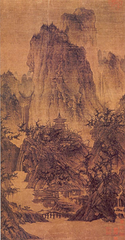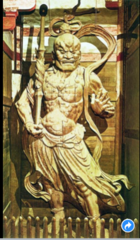In the Medieval period in India, the term "sati" meant
the wife threw herself on her mate's funeral pyre
Which of the following events in Indian history approximate events of the Western Middle Ages in Europe?
the end of the Gupta dynasty to the Mongol invasion of India
The devotion of an upper-caste Hindu woman to her husband was dramatically expressed in __________, a custom by which the wife threw herself on the funeral pyre of her late husband
sati
The dominant religion in India today is
Hindu
India's most ancient texts are
the "Vedas"
Today, approximately eighty-five percent of India's population is
Hindu
Which of the following correctly describes the major religion of India?
unique in having no historical founder, multiple gods are perceived as multiple aspects of the one god, and has no monolithic authority center or hierarchy
The fundamental Hindu belief is based on
the divine, human, and animal as one
An avatar is
an incarnation
According to the text, a direct interpersonal contact with the Hindu godhead can be achieved
by gazing steadily at a visual representation
Which of the following is NOT a member of the Hindu "trinity" as described in the text?
Krishna
Images of deities in Hinduism represent
the god is present in the image
The principal gods, Brahma, Vishnu, and Shiva, express three aspects of Brahmanic power
creation, preservation, and destruction
Indian poetry makes use of several literary devices, such as the intentional similarity between vowel sounds, known as
assonance
The poetic language of ancient India is called
Sanskrit
Hindu perception of time is
cyclical
The Lord of the Dance is
Shiva
The architectural ideal of the early Buddhist and Hindu temples was to represent which of the following?
the sacred mountain
A particular melodic sequence in traditional Indian music would be called
raga
Sanskrit is the
language of the educated classes
Hinduism regards the physical union of male and female
as symbolic of the eternal mingling of flesh and spirit
The word __________ is used to describe music in the Indian language and means both "sound" and "rhythm"
sangeeta
The famous Venetian merchant who visited China in the thirteenth century was
Marco Polo
Sanskrit lyric poetry is
the most erotic of all world literatures
Which of the following was NOT allowed in lyric poetry?
grief
Under the rule of the __________ emperors from 618 C.E. to 907 C.E., China experienced a flowering of culture that was unmatched anywhere in the world.
Tang
The main route to official status in China throughout its long history has been
the imperial examination system
The Hindu temple symbolized the
sacred mountain
Which of the following does NOT represent the function of the Hindu temple?
place for congregational worship
The Hindu temple was like the Gothic cathedral in that
it was a kind of "bible" in stone
The sitar is
a musical instrument
Which of the following was NOT a Confucian teaching?
commitment to celibacy
The Tang dynasty achieved all but one of the following reforms. Which one was NOT one of the reforms?
putting an end to the economic policies of their immediate predecessors
The Song Era of China advanced all but one of the following. Which does NOT belong?
heroism
The text compares Chinese poetry to
vocal music
The earliest printed book is
the "Diamond Sutra"
Chinese painting draws heavily on
everyday activities of men, women, and children
alliteration
a literary device involving the repetition of initial sounds in successive or closely associated words or syllables
luohan
a term for enlightened being, portrayed as a sage or mystic
mithuna
the Hindu representation of a male and a female locked in passionate embrace
novel
an extended fictional prose narrative
opera
a drama set to music and making use of vocal pieces with orchestral accompaniment
porcelain
a hard, translucent ceramic war made from clay fired at high heat
samurai
the warrior nobility of medieval Japan
syncretism
the effort or tendency to combine or reconcile differing beliefs
tala
a set rhythmic formula in Hindu music








